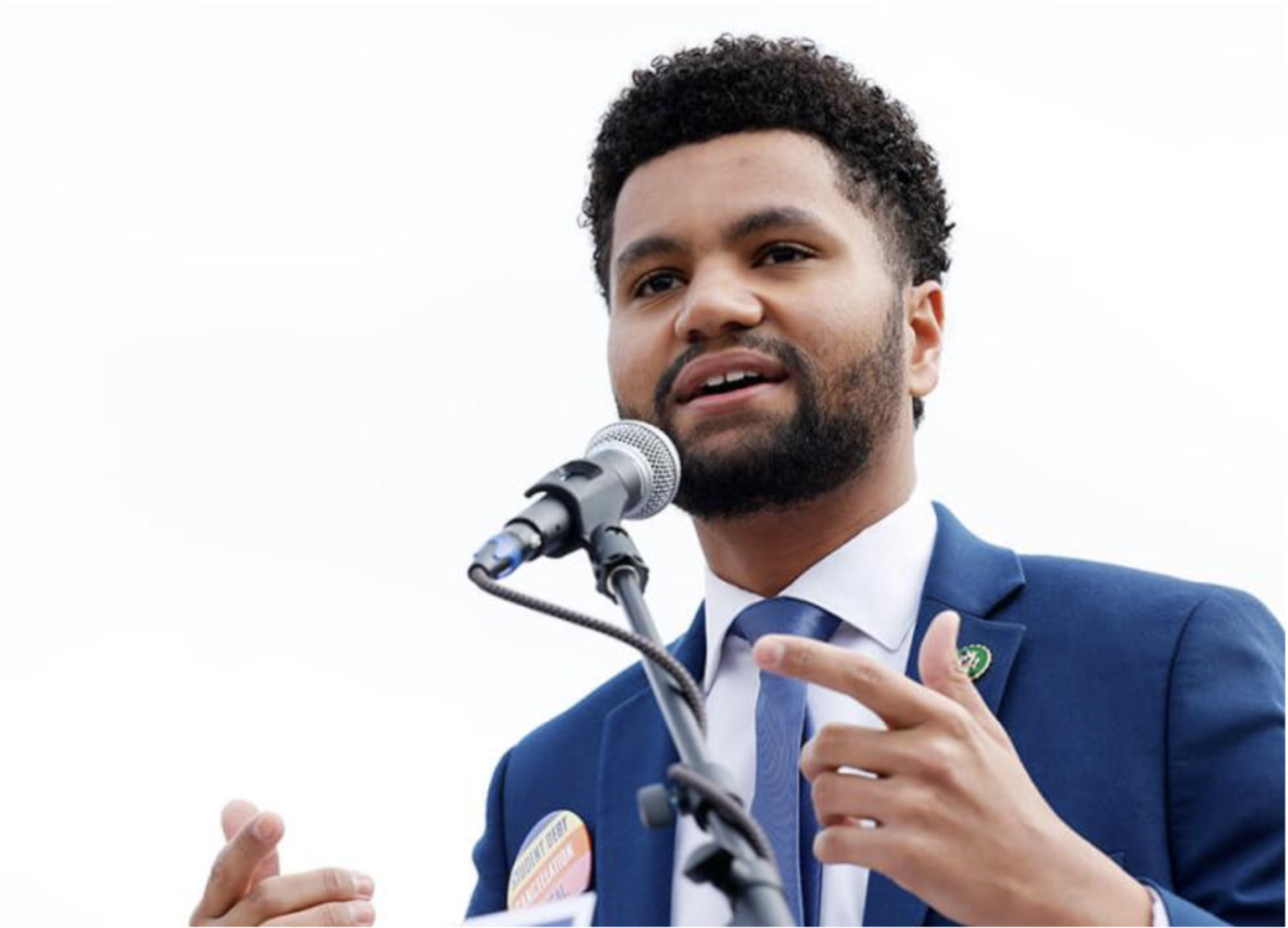In 2022, Maxwell Frost, Fla.-10, made history when he became the youngest sitting member of Congress, as well as the first member of Generation-Z to be elected to Congress. Before his career as a politician, Frost was an organizer and gun violence prevention activist. He first became inspired to organize against gun violence following the 2012 shooting at Sandy Hook Elementary School, and worked as the National Organizing Director for March for Our Lives. Since coming into office, Frost has continued working on this issue, introducing the 2023 Office of Gun Violence Prevention Act. On April 5, Frost appeared at the John F. Kennedy Jr. Forum at the Harvard Institute of Politics to discuss his career. Following his forum appearance, Frost sat down with The HPR to discuss the 2024 election, youth engagement, and gun violence legislation.
This interview has been edited for length and clarity.
Harvard Political Review: How do you talk to young voters who are feeling disillusioned by the upcoming election, especially those who believe President Biden didn’t do enough to address violence in Gaza?
Maxwell Frost: I like to talk about a lot of the wins we’ve gotten thus far. And the fact that, as an organizer, the way I like to view voting is the opportunity to pick what the battlefield is politically, and who we’re negotiating with and working with. And between the two options we have, as a progressive, and as a survivor of gun violence, it’s quite clear, right? That with one, we’re going to take many steps back, and with the other, you know, it’s someone who actually will bring the movement in. And sometimes we’ll agree, and sometimes we won’t, but it’s a more positive environment for the type of world that we fight for.
And you can see that, through the massive movements and protests around what’s going on in Gaza, there’s been a movement. Had there been a President Trump, I’m not sure there’d be any kind of movement. In fact, I think it would fuel more in the opposite direction, to be honest. So that’s the way I think about it. But you know, voters have got to make the decision for themselves, and who you vote for and if you vote, it’s a pretty sacred decision. What I encourage people to do is think about it, at least don’t just toss it off. And think about the longevity of the world you want to fight for and the world that you want. And, when you make a decision, is it in service to that or against it? That’s the main thing we have to wrestle with.
HPR: In relation to getting youth involved, what are the biggest lessons you’ve brought from your time as an organizer into being a public representative?
MF: I think the big thing is there’s a lot of programs that do a lot of shaming apathy instead of inspiring hope. And I think that young people, when you shame some sort of apathy, a lot of times you can turn off a voter for years, for cycles, or maybe even for their whole life. You know, young people especially have been lied to by politicians so much that I think validating the root of their concerns is really important. I get it, but also pointing to real wins and how their vote can actually have a tangible outcome I think is important, and showing people that government can work for them.
So we’d like to do that in finding ways to bridge the gaps between cool and consciousness. So we do that through a lot of art space stuff. For instance, I just hosted a music festival. We had 3,500 people come out, and all those people when they came in, we registered them to vote. And then, instead of having vendors, we actually had organizations where they got to connect with local groups to see how they want to be involved, and it might be different for everyone. For some people it might be the [Young Democrats], for some people it might be the Dream Defenders or a mutual aid organization. And being able to be in touch with the totality of the movement in your area gives you the opportunity to bring more people in, because there’ll be something different that activates everybody.
HPR: What do you think Congress needs to do in order to get past the gridlock you discussed at the Forum, especially around gun legislation?
MF: I mean, around gun legislation, it’s quite simple: We just need to elect people, different people. Unfortunately, the gun lobby has a huge hold on many members of Congress. Even though their heart is in the right place, and I’ve had conversations with moderate members of Congress who want gun legislation, but they’ll tell you behind doors, “I can’t do it. I can’t do it in my party.” And so as an organizer, what does that mean? We just need different people. And we have the opportunity to do that.
And that’s not on every issue, right? There’s some issues where I think there’s appetite for bipartisanship, but having worked on the gun issue for over a decade now, I’ll tell you that I’ve sat in rooms with people who have cried with me, with mothers who have lost people to gun violence, the next day voted the same way they’ve always voted. So I’m a bit more pessimistic on people’s hearts being changed, with “this is the shooting that’ll do it, this is the shooting that’ll do it.” I think maybe this is the shooting that’ll push that one person who’s been sitting on the sidelines to run for office, who will beat someone who doesn’t want to vote on good legislation on gun violence, and then we have the majority we need. And that’s how that bill was passed just two years ago.
Interviews Editor




